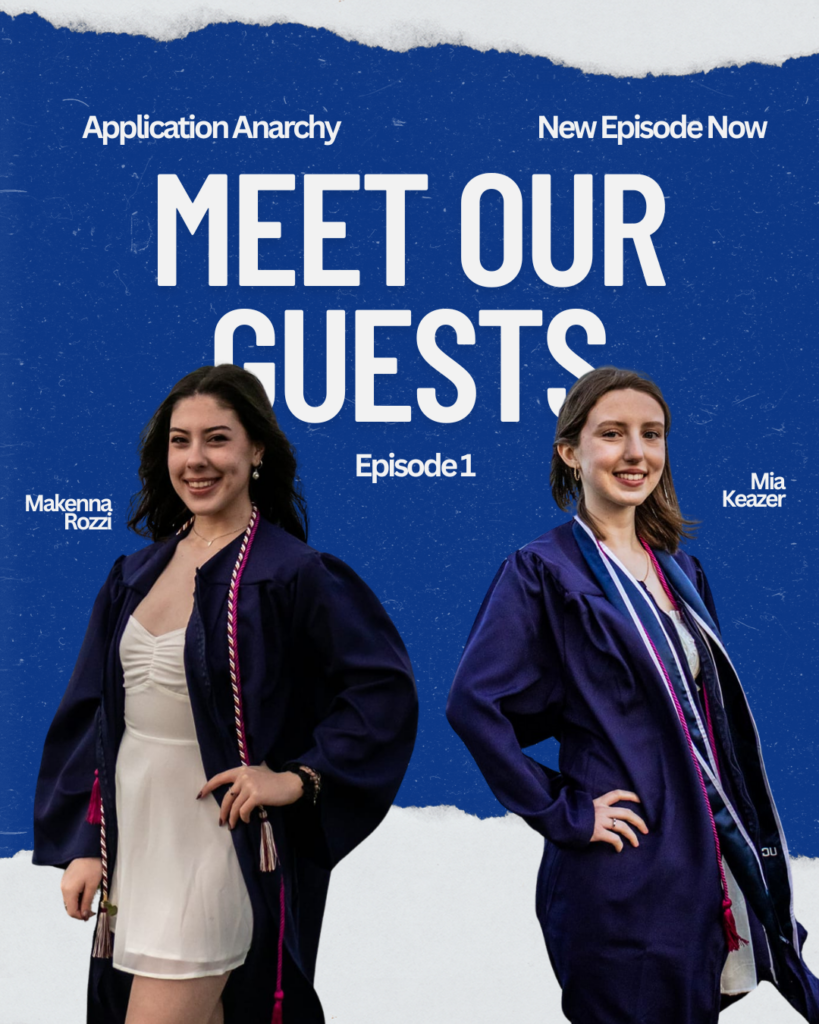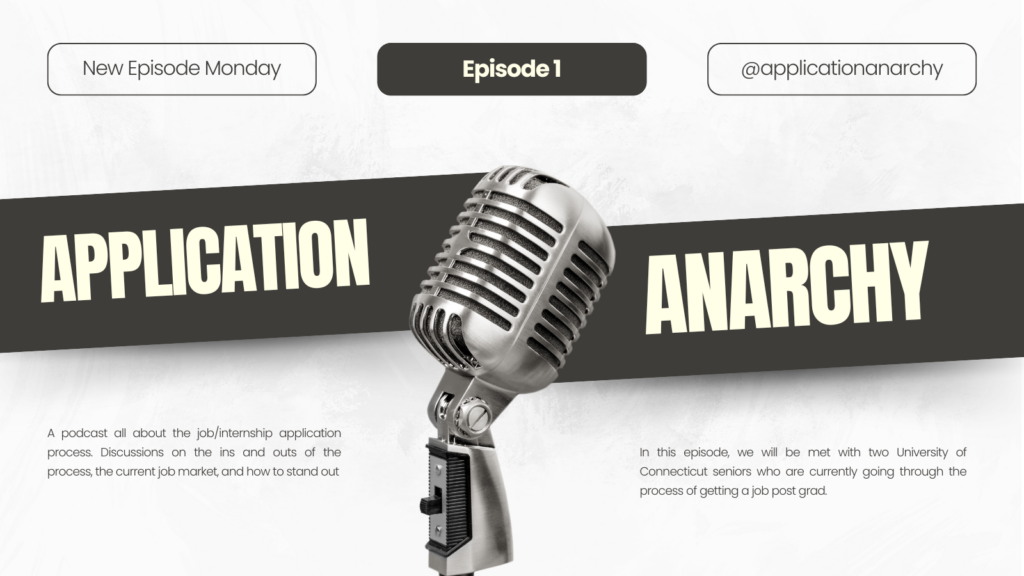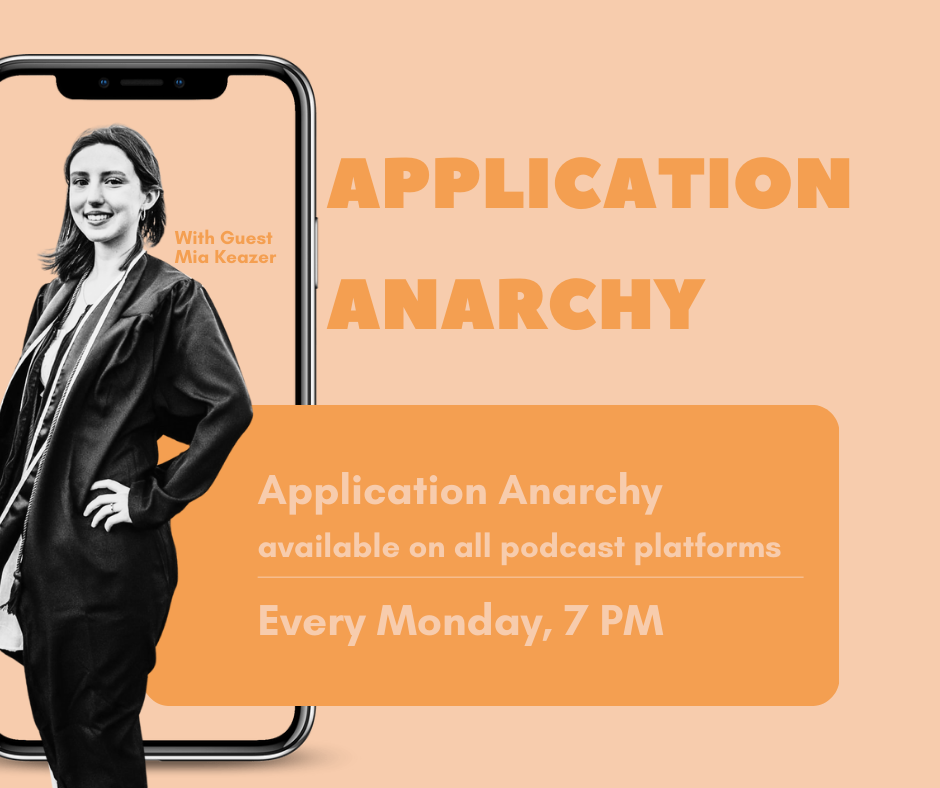Are you a student applying to internships or jobs? How has the process been? The job market has hit a low point that is affecting thousands of undergraduates and graduates. In this episode your host, Delaney Wilkins, will explore topics regarding the current job market, such as AI usage and LinkedIn tips. You will hear from two graduating students at the University of Connecticut that have experience with the application process and may provide comfort to anyone struggling.
Transcript:
Delaney: As most college students have proclaimed, the job market is rough. Hundreds of companies are looking for interns, yet rarely anyone seems to be getting offers. Why is this? We are living in an ever changing world and that translates into the job market. Whether it is jobs using AI to sort through applicants, or the record number of applicants, it is undeniably an issue every unemployed person has noticed. Welcome to Application Anarchy, where we discuss every aspect of the application process. Today I will be joined by two University of Connecticut students, Mia Keazer and Makenna Rozzi. Mia is a student worker in the UConn Center for Career Readiness and life skills. Makenna is a senior who will be graduating in two weeks who has been through the process. These two perspectives should provide hope and comfort to all those who are going through the application process or will be in the future. Even with resources through the school, it can be hard to get your foot in the door. Many companies have gotten rid of their internship programs or are in hiring freezes. This creates less opportunities for college students and graduating students. However, it also becomes an issue for companies. They are typically unable to offer these opportunities as it is either not in their budget or they can’t offer as much work for interns to make it worth their while.

Mia Keazer: I was kind of spearheading this marketing plan for the alumni residence program which basically connects current undergrads with alumni for mentorship opportunities. So super cool. Within that I did a bunch of like, like everything you can think of for marketing, like advertisements, email campaigns. If you’ve ever gotten an email saying check out this alumni residence program it’s probably me. basically a mix of everything. So I’ve been working on that most of the year. And I also like scout alumni for different alumni facing activities at UConn, so like classroom visits or you know, like virtual panels or in person panels, stuff like that.
Delaney: How do we shape ourselves to fit companies? With the state of technology, everyone and everything is looking for the next best thing out there. As someone who is in a creative major field, there is always a portfolio aspect. There are a number of people on TikTok and LinkedIn who have shared their portfolios that have landed them jobs. Let’s just say they are not your standard portfolio. One girl applied for an internship with Victorias Secret. This portfolio and application was completely tailored towards the company, using graphics to mimic the style of the company. This is a standard that a lot of companies have begun to uphold, but it is not specifically stated. The company want to see how you can mold to fit them. Every application must be tailored to the company, which creates a lengthy process.
Mia Keazer: My supervisor Mary actually told me, so I kind of got into that rhythm of like, Easy applying on LinkedIn to like, so many jobs. And, she used to be some sort of like, like recruiter or like, she helped people get jobs, something like that. Sorry, Mary. I forget. But she said that, like, she would see a lot of success when people really just like, honed in on their goals and like, what they actually want and then just applied to jobs that they were genuinely interested in. And I was like, ugh like, it’s sounds like, I’m like, oh, that’s not gonna get me anywhere. But sure, Mary, like alright but I actually started doing that and like, we were able to sit down and just have a conversation about, like, what I’m actually looking for. And through that conversation, I realized that I was so all over the place. Like, I was just looking at any random job. Like, I’ve always been like, oh, I want to work. Like, I don’t want to go back to New Hampshire where I’m from. I want to like, I want to move into a city or like, have some sort of like, like a remote job where I can like, commute to a city, like, or hybrid, whatever. But I was, you know, I was applying their jobs, like, random ones, like communications coordinator for the state of Maine. And I’m like, I don’t want to do that. Like, just I was putting my name on any application that I saw. And so once we kind of narrowed down what I wanted, I was like, wow, like, this actually makes me feel a lot better. Like, even if I wasn’t seeing, like, I wouldn’t say it opened up more possibilities for me, but I just felt more secure and I felt better. So that was great. And then I really do, you know, once I started putting effort into, like, cover letters and like, tailoring my resume to each individual job, I did start seeing more results.
Delaney: A digital age has created a new level of difficulty with the process. Cold calling used to be a normal part of the process. Now it is seen as disrespectful to the process. Everything is meant to be done online, often through second or third party websites like LinkedIn or Handshake. These websites make the process feel less personable. To add to that feeling, many applications ask, are you okay with the use of AI to review your application? This creates a whole new layer of digital impersonability. That aspect has raised a few questions from me and others. How are we sure that the applications are being looked at by hiring managers. How are we sure all applications are giving a fair chance?
Mia Keazer: I know that companies use it to, you know, like look at resumes really quickly. And it does definitely make me wonder like how many times AI has gotten my resume like wrong or like misinterpreted it somehow and I’ve lost out on a job opportunity because of it.
Delaney: What sets an applicant apart? Is it your experiences or how you manipulate your experiences? Not everyone is able to gain experiences through internships or past jobs. However, there are ways to describe the experiences. You do have to tailor yourself to your pursued career. That is something you can do through a cover letter or your resume. Let’s say that you have never had a job or internship, but you are looking to apply. A common tactic is to put focus on your coursework. It’s likely your major and classes have to do with your ideal career. This is a perfect chance to discuss the work you have been able to do in your college career.
Mia Keazer: Only organization that I’m like really part of is Her Campus I mean first of all, being like technically a published writer looks so good. Like you know how to write, you know how to communicate. Obviously being on Eboard and being the Instagram manager has its like secondary perks. Like probably better than just being like in Her Campus But I think like even the network that you make, I mean like you can take soft skills out of everything. I feel like, like you could, I don’t know, like you can just do something random and be like, I learned how to communicate, I learned how to problem solve. Like it’s so valuable.
Delaney: The biggest piece of advice that seems to be circling is networking. Colleges are constantly holding networking events and students are encouraged to connect with their professors. LinkedIn is another large outlet for networking. However, this comes with its pros and cons. Many people believe this is a perfect outlet for networking. The use of messages to people and careers alike. To learn a little more in gain connections. This is common advice that is given to students. Other people go against this narrative and say that it isn’t always the best look, you’re encouraged to gain as many connections as you can, but this is also has been given a bad reputation. Almost as if you are willing to connect with anyone and have little sense of exclusivity.

Makenna Rozzi: I don’t use it much but I know it’s a great place to like get fireplace chats or just like what I’ve seen people do is look at people like in a position that you want to be in and then you see where they started because their whole list of all their jobs where they’ve been will be accessible. So it’s kind of a great way to see like where you can start.
Mia Keazer: One of my favorite things to do on LinkedIn now it was a lot easier when I had LinkedIn Premium because I could message people more easily. But just reaching out to people like the hiring manager or hr, anyone like the person posting a job sometimes like job postings will have like, here’s who you can reach out to. Just messaging them gets you really far. Just to connect with someone I think helps you feel closer to the job.
Delaney: At this time, it seems that most applicants are looking for any opportunity they can get. Those that are more than qualified are applying for entry level jobs or even minimum wage jobs. A number of people have shared their stories for being turned down for waitress jobs when they are wanting an office job and are highly qualified for more. This has shown the competitiveness of the market. Most positions have become harder to achieve which can become discouraging. Other people may have an easier time getting their opportunities, but is it luck?
Makenna Rozzi: I know most people apply like to a wide amount of companies. I only apply to one. Oh dear. But it’s mainly because like that was what I was set on doing. My sister was part of the program. It’s like this nonprofit thing. So I kind of had a shoe in.
Delaney: Overall, there’s a lot of uproar from students against the job market. Some have had an easier time than others. However, this doesnt mean there is an inherent issue. When will this problem be resolved? Or do we have to build ourselves to lessen the problem at hand?
Research Links: Portfolio Example, Hiring Freeze, It’s Impact, AI Screening, UConn Career Center


